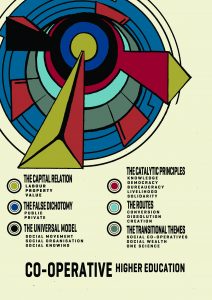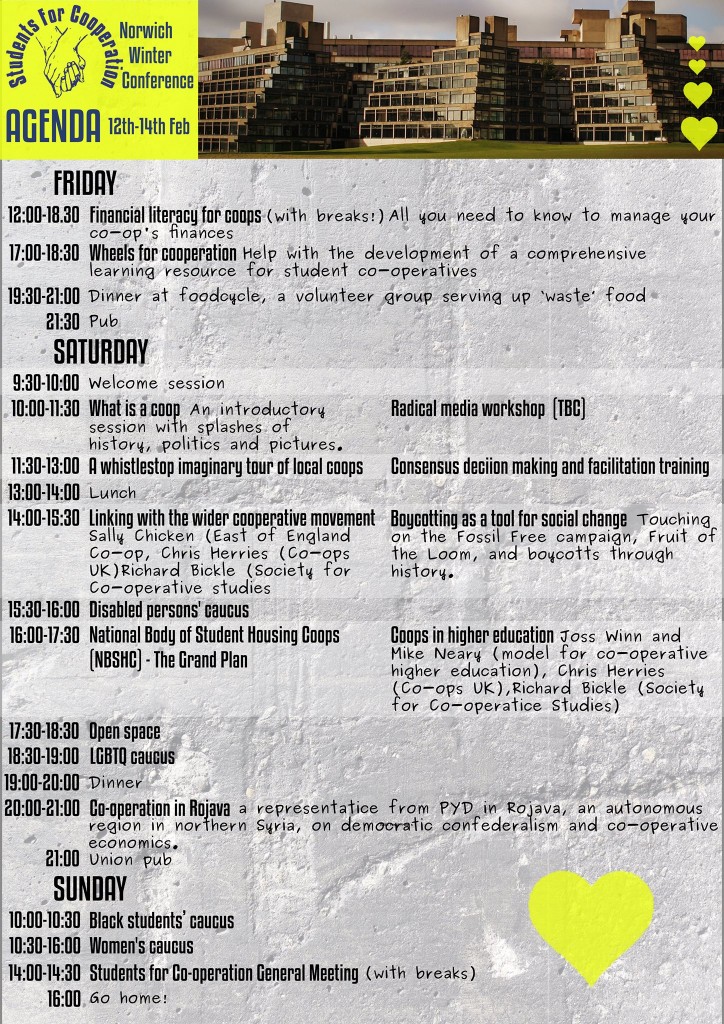With the exception of a few thoughts on an unexpected and emotional encounter, I have not had much to add to this blog since completing my PhD. However, as always, work continues and is being reported on the Social Science Centre website, where Mike Neary and I post about the progress of our ISRF-funded research project: ‘Beyond Public and Private: A Model for Co-operative Higher Education‘.
You’ll see from the updates on the SSC website that we are over half way into the project, having completed three of the five planned workshops and focus groups: Pedagogy, Governance, and Legal frameworks. We are also interviewing individuals regularly and almost 80 people (students, academics, ‘co-operators’, and others) have joined our project mailing list, which clearly has the potential to become a formal research network into co-operative forms of higher education. We are meeting many really interesting and experienced educators, researchers and activists through this project, which, as we reported from the first workshop, is developing around three inter-related concerns for co-operative higher education:
1. The Social historical movement: A co-operative form of higher learning conscious of its connection to and engagement with the historical and logical development of the co-operative movement.
2. The Organisation: The institutional form of the co-operative will substantiate the political, moral and ethical values of the co-operative movement, set within an educational context.
3. The Praxis: The pedagogy will be grounded in the practices and principles of co-operative learning, recognising that much can be learned about how to be a co-operator-student/teacher (i.e. ‘scholar’), while at the same time acknowledging that co-operative practices are already endemic in radical social interactions.
Each of the workshop themes can be ‘mapped’ on to one or more of these three higher level components of the ‘model’.
I am also thinking of how other concepts might express or expand on the five themes. For example:
Pedagogy = Knowledge
Governance = Democracy
Legal = Bureaucracy
Business Models = Livelihood*
Trans-national = Solidarity
*This is a word that came out of a discussion on how we want to move away from the use of some conventional terms, such as ‘business model’, that do not adequately capture the essence of our concerns. In a world where business and work is continually in crisis, a ‘business model’ seems increasingly anachronistic to what is fundamentally required.
Our project aims to develop a ‘model’ for co-operative higher education, or perhaps a ‘framework’ is a better word to use. Nevertheless, models and frameworks are forms of useful abstractions and at this stage of our work, sketching out relational themes, concepts and approaches is a necessary and useful exercise. This has been evident in the way that the categorisation of ‘routes’ to co-operative higher education that I outlined in my earlier paper have been a useful reference during each of the workshops:
Conversion: How to convert an existing university into a co-operative, either through a planned ‘executive’ decision or out of necessity, as in a worker takeover of a failing institution. In the UK, this route would seek to maintain any remaining public sources of funding and the ‘university’ title.
Dissolution: How to create a co-operative university from the ‘inside out’, through the gradual increase of co-operative practices, such as co-operatively run research groups and departments; programmes of study in aspects of co-operation, social history, political economy, etc.; the conversion of student halls into housing co-ops; changes to procurement practices that favour co-operatives, and so on. Through this route, the university might eventually become a ‘co-op of co-ops’.
Creation: How to create a new co-operative form of higher education. This tends to be where our workshop discussions end up. It is the least compromising of each of the routes and in some ways the most ambitious. Discussions of this route are intensely practical in their focus and unashamedly utopian, too. This route draws inspiration from the huge numbers of actually existing worker and social solidarity co-ops around the world.
So, in summary what might we have with all of this?
Three routes to co-operative higher education: Conversion, dissolution, creation
Three concerns for the overall project (regardless of route): The social historical movement, the organisation, the praxis.
Five themes for practical and theoretical work (an anti-curricula or course of action): Knowledge, democracy, bureaucracy, livelihood, solidarity.
Mike Neary and I will shortly be writing up an interim report on the project at the request of the LATISS open access journal and will attempt to summarise all of this for the benefit of our own thinking and that of all the research participants.
If you would like to contribute in some way to the project, we have two more workshops (Nov 20th, Jan 29th), each followed by an online focus group, and we’d be happy to interview you too. We will also be issuing a survey in February which will be a last ditch attempt to gather data before we analyse it and write it up in the Spring.


